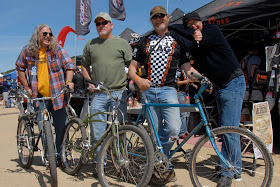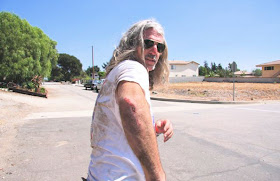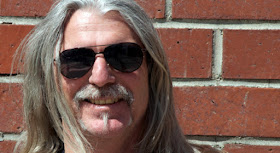 |
| Billy Savage, Alan Bonds, Charlie Kelly, and Gary Fisher |
William’s self-financed film is a loving look at the early days of the Northern California mountain bike scene especially early pioneers from both the South Bay and Marin County. Even though William grew up in Marin County he was keen to point out he was only twelve-years-old when the first Repack race was run in 1976.
Later, William would involve himself in both the Northern California music scene and worked with the famed concert promoter Bill Graham, and in the film industry working at George Lucas’ Skywalker Ranch.
 |
| Billy after having some fun |
William Savage agreed to be interviewed by Bicycle Industrial Complex and graciously volunteered his time to answer some questions.
Questions for William Savage:
BIC: You were able to track down a lot of people who were involved with the early days of mountain biking, who did you want to speak to but were not able to contact?
Billy: I initially made a list of about 40 individuals that I was hoping to track down. Most were in California, but there were a few scattered in other states; and I was hoping to get Geoff Apps in the U.K. After a few months of research I realized that I was going to have to concentrate my energy on a more specific timeframe and geographic area if I wanted to tell a story instead of making a compendium of sorts.
I would rather explore fewer lives, but take a more in-depth look at those lives. Since I grew up in Marin, I decided I would use that location as the epicenter and work my way out from there. I also decided that I would end the film with the introduction of the first, mass-produced mountain bikes in the 1981-1982 period. That helped to whittle down the list significantly
BIC: I noticed that there were some early mountain bike people who were missing in the movie Klunkerz such as any of the Koski brothers, Scot Nicol of Ibis and Victor Vincente of America. Obviously time and money are concerns when making a movie, but were there other mitigating factors?
Billy: The people you mention were all on the original list. I spent significant time and resources trying to develop a relationship with the Koskis, Erik in particular but Don and Dave, too. They were right there in the beginning and I really wanted to get into their work on the TrailMaster and Pro-Cruiser with Mert Lawill and Terry Knight.
Before the release of the film I was able to procure a couple of pictures, few home movie clips and a business card from Don Koski. I wrote and recorded a piece of narration and cut the shots into the film at the last minute, just to have them in there somewhere. If you look closely, you can spot them.
Victor Vicente of America (a.k.a. Michael Hiltner) and his Topanga bikes and the Reseda to the Sea race was going to be a complete chapter. It was dependent on my interview with Professor J.F. Scott from U.C. Davis.
Professor Scott was an investor in Gary Fisher and Charlie Kelly’s company, MountainBikes, and he had this amazing double-decker school bus converted to hold twenty plus people and all their cycling gear. He took all the Marin guys and gals to the first Reseda to the Sea race in 1980.
I think Professor Scott, Gary, and Charlie thought it was a great marketing opportunity to show what the new MountainBikes bikes could do. Gary ended up smoking everyone in the field and it was a shining example of where these off-road bicycles were headed.
BIC: You had mentioned in several interviews that you were inspired by Stacy Peralta’s film “Dogtown and Z-Boys” but I’ve noticed too that America in the Seventies had a real explosion of subcultures, mountain biking, punk and skateboarding… Do you see any commonality in them?
Billy: The real commonality of these subcultures seemed to be that, this was all happening in California. I don’t know why, maybe it was something in the water. Skating, surfing, bikes, music...it was a great time to be a kid in California.
Everything was made right here: from the skate shoes we wore (Vans), the jeans were wore (Levis), the shorts we wore (Birdwells), the guitars we played (Fender!) the boards and bikes we rode, everything. It’s really a shame that all that’s gone now, for the most part.
Our parents had no clue where we went, who we were with, or what we were doing...and that was fine with us! We had a lot more independence then, and we weren't tethered to our parents via cell phone or whatever.
Everything was all out adventure. You’d get together with your friends and go hard at whatever it was until someone’s bike, board, guitar, or whatever broke... or someone got hurt. I sort of blame that on The Ramones. For some reason they made me and my friends want to break stuff.
BIC: We had quite a few email exchanges and one of the things you had mentioned was that the film was a financial disaster for you, and you said, “I couldn't get a single industry sponsor even though I was making a feature-length commercial for various brands”. Why do think the bike industry was so reluctant to help support your project, but are more than willing to spend big money on splashy commercial shoots?
Billy: I met with executives from about a dozen companies that I felt might have benefitted from being associated with the project. I wrote individual proposals for each company with half a dozen levels of commitment ranging from $500-50,000.00. I couldn't get $500 from a single company. Who’s to say why? Perhaps they didn't think I’d make a good film, or any film for that matter.
Many said the timing wasn't right, since their marketing budgets for the year had been eaten up already. Maybe there were concerns about how their brands would be represented. Whatever the case, it just wasn't happening.
After I finished the film, I worked on a corporate project for Shimano and they paid me, for which I am grateful. I used the money to put up my website for the film, so I added their logo on the DVD packaging as a thank you, so I guess I did get one sponsor, sort of. Mike Sinyard from Specialized was kind enough to give me some promotional items for the goodie bags I gave away at the world premiere too.
I guess Klunkerz was just an unconventional project that didn't fit into the current action sports/sponsorship mold. That’s okay, because I got to make the film I wanted to make. I think most of the guys and their brands were well represented, and they were happy with the way things turned out.
BIC: Since you bridge a gap between the film industry and bike industry, which industry was more difficult to work with and why?
Billy: I think that really relates to the question above. I was a total outsider in the bike world, so I had no credibility in the beginning. That’s why the project was difficult to get off the ground. Had I known more people and had stronger relationships within the bike industry, I might have been able to secure some sponsorship money. Since I didn’t, I had to come up with the funds myself. I think both industries are difficult because everyone wants to be a part of them.
There is a lot of competition. With that comes an element of schadenfreude. It’s just what it is. I essentially bought my way into the bike world by making the movie. I got to hang out with the pioneers of our sport and tell their story. I created lasting relationships with some of the guys. The times we shared, the rides, the stories...it was well worth the price of admission.
BIC: Klunkerz came out in 2006 and International Movie Database (IMDB.com) is really thin on any current details about you, what projects are you working on at the moment?
Billy: I work in the development of features, series, and whatnot, so there are always a million projects going on. Most of them never see the light of day, but you can earn a living anyway. Currently our company has a slew of projects going on that I’m very excited about being a part of, but who knows if they’ll ever get made. That’s just part of the process.
I’m just super happy to have a job in this industry. We get to make stuff up and get paid for it. As far as cycling films go, I have been working with a director in NYC on another project, The Ghost Bike Project. It’s a pretty heavy documentary about the memorials that are placed when a rider is killed on city streets. It’s a worldwide movement. Like Klunkerz, it’s a long-term project. It’s been going on for a couple of years now. Documentaries take a lot of time and energy and this one is no different.
BIC: What advice would you give anyone who was interested in a career in film?
Billy: Get all the education you can and realize that’s only about 10% of what you’ll learn on your first film. See as many films as you can. Emulate those filmmakers that you respect. Listen to your heart. Dream big.
The Official Klunkerz Website http://www.klunkerz.com/trailer-1.html
 |
| William Savage |
The Official Klunkerz Website http://www.klunkerz.com/trailer-1.html
No comments:
Post a Comment